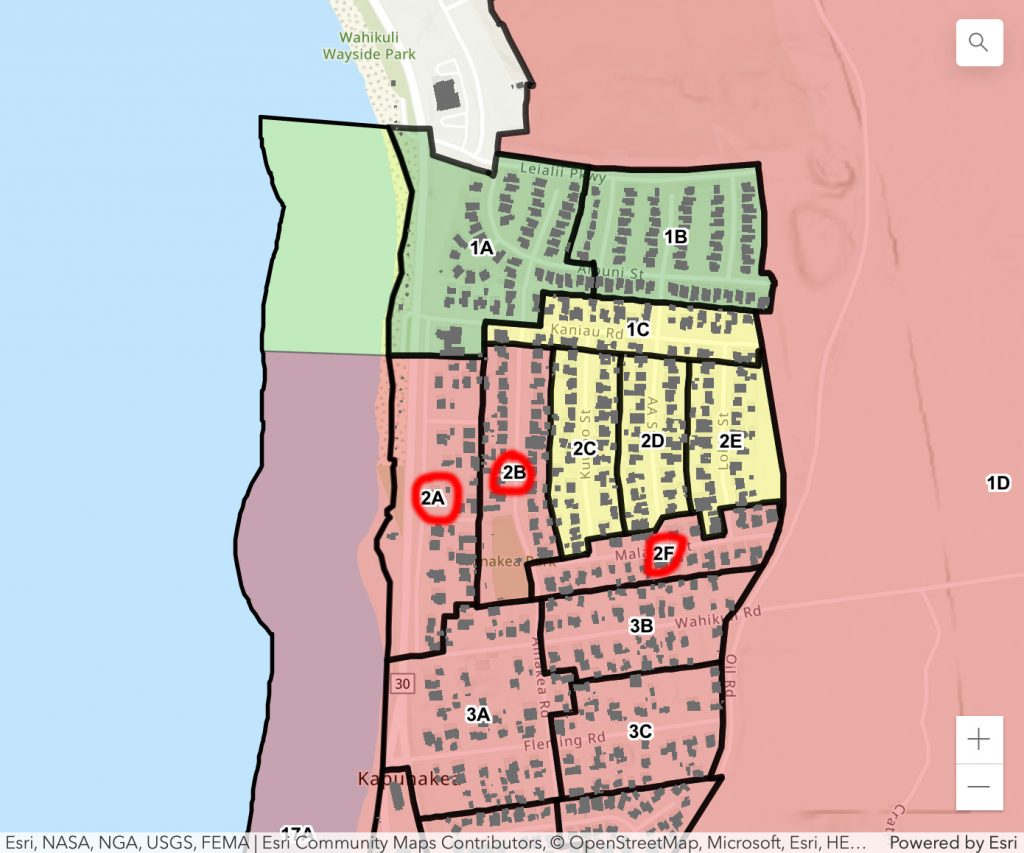Restrictions to be lifted for Zones 2A, 2B and 2F including parts of Malo and Malalani streets, Kalani, Kekai and ʻĀinakea roads

Disaster area restrictions will be lifted on Friday and Saturday, Oct. 6 and 7, for owners and residents of Zones 2A, 2B and 2F. This includes parts of Malo St., Kalani Rd., Kekai Rd., ʻĀinakea Rd., and Malanai St.
Hours of supported reentry on Oct. 6-7 are from 7 a.m. to 3 p.m. After that, access through the checkpoint will be available from 8 a.m. to 4 p.m. daily for area residents with a vehicle pass or ID.
To obtain a vehicle pass, applications are available 8 a.m. to 4 p.m. Wednesday, Oct. 4 and Thursday, Oct. 5, at both the Lahaina Civic Center and in the County of Maui Kalana O Maui building lobby. On-site distribution will also be available at respective zones.
Reentry vehicle pass will be required at the checkpoint during the first two days of supported residential reentry. Two vehicle passes will be available per property owner, and two vehicle passes will be available per rental dwelling.
Optional Personal Protective Equipment kits and instructions for usage will be available from nonprofits during vehicle pass distribution.
All roadways to access zones will be clear for residents and property owners. During the first two days of supported reentry, access to the area will be through Kaniau Road off Honoapiʻilani Highway (right-turn only).
County official say once a fire has burned through an area, many dangers may remain. “It’s important to be aware of the hazards and to know what to look for when reentering,” county officials said.
For full safety details, visit www.mauirecovers.org. For air quality information, visit https://health.hawaii.gov/mauiwildfires/. A County of Maui Department of Water Supply Unsafe Water Advisory remains in effect for portions of Lahaina and Kula. For water advisory, visit https://www.mauicounty.gov.
A high level of support will be provided to returning residents during the first two days of reentry including water, shade, washing stations, portable toilets, medical and mental health care, MauiBus transportation from local hotel shelters and language assistance. Transportation to and from hotel shelters on Maui Bus circulator shuttles will have extended hours on the first two days of supported residential reentry from 7 a.m. to 7 p.m.
For residents in zones that have already been cleared for reentry but who have not yet received a vehicle pass, applications will be available on an on-going basis at Lahaina Civic Center, Monday through Saturday, 8 a.m. to 4 p.m., and at the County of Maui Kalana O Maui building lobby area, Wednesday through Saturday, 8 a.m. to 4 p.m.
The following documents may be used to verify property ownershipor occupancy to receive a reentry vehicle pass:
- Property Deed or Title: A property deed or title in your name is one of the most direct ways to demonstrate ownership. This document should clearly show your name as the property owner.
- Utility Bills: Utility bills such as electricity, water, or gas bills that are addressedto your nameat the property addresscan serve as proof of residency. Thesebills should be recent and show consistent usage.
- Property Tax Records: Property tax records from the county’s Real Property Tax office that list you as the property owner are strong evidence of ownership. Visit: www.mauipropertytax.com
- Lease Agreement: If you have been renting, a lease agreement with your name, the landlord’s name, and the property address can establish your residency.
- Hawai’i Driver’s License: A valid Hawai’i driver’s license with your current address is a widely accepted proof of residency.
- Vehicle Registration: If your vehicle is registered at the property address, it can indicate your residency.
- Voter Registration: A voter registration card listing your address in Lahaina can be used to confirm your residency.
- Financial Statements: Financial statements sent to your Lahaina address can help establish residency, especially if they cover an extended period. Driver’s license or identification card, Tax records or financial statements, Voter registration or court documents, Vehicle registration form, Employment agency registration or pay stubs or checks)
- Insurance Documents: Homeowner’s or renter’s insurance policies with your Lahaina address can be used as proof of residency.
- Notarized Affidavit: In some cases, a notarized affidavit from a property owner or landlord confirming your residency or ownership may be accepted.
For details on reentry to impacted areas; safety information for returning to your property; drinkingwater and wastewater; maps and data; fire debrisremoval; recovery phases; financial and housing assistance; and business support, visit www.mauirecovers.org.




_1768613517521.webp)







